‘Erroneously’ transferred : Planning commission wants CDWA project taken back
Climate ministry refuses to take over project till NAB, FIA inquiries completed.

The planning commission has written a letter to the MoCC stating that the CDWA project was erroneously transferred to it and that the planning ministry lacked the institutional knowledge to execute the scheme.
In 2003, the Ministry of Environment launched the project, under which one water purification plant would be installed in every union council across Pakistan. The project was transferred to the Ministry of Industries, Production and Special Initiatives in 2006, and in 2010, the industries ministry transferred it to the planning commission.
The planning commission has said that the MoCC has the institutional knowledge to execute the project and may take over.
The planning ministry’s letter has come to the fore at a time when numerous inquiries are under way against alleged mismanagement and corruption in the project.
The National Accountability Bureau, the Public Accounts Committee and the Federal Investigation Agency (FIA) have all been carrying out inquiries against alleged misappropriation and mismanagement in the CDWA project over the last six. Sources said contractors also have dues of around Rs235.7million in pending payments.
A senior MoCC official said the ministry was reluctant to take over the project till the ongoing inquiries were complete and previous liabilities cleared.
In 2005, the Pakistan Environmental Protection Agency under the Ministry of Environment (MOE) awarded the contract for 265 water filtration plants to Rain Drop, a private firm, to install one plant in each tehsil under the Clean Drinking Water Initiative (CDWI) project.
The MoE initiated CDWA while CDWI was active.
In an October 2006 meeting, then-president Pervez Musharraf and prime minister Shaukat Aziz directed MOE to wind down CDWI and transfer both projects to the ministry of industry.
Accordingly, the CDWI project was transferred without settling contactors’ accounts.
A new ministry of Special Initiatives (MoSI) was also created and both projects were transferred to it.
In 2010, as a result of the 18th Amendment, the MoSI was dissolved and both the projects were transferred to the planning commission.
Clean water for a handful
Pakistan is among the world’s most water-stressed countries. Water availability has decreased from 5,000 cubic metres per capita in the 1950s to just 1,000 cubic meters per capita in 2007, mainly due to the rapidly increasing in population, inefficient irrigation networks, poor water resource management, and corruption.
More than 40 per cent of the total population does not have access to safe drinking water. More than 50,000 children die every year due to diarrhoea and other diseases related to unsafe drinking water and poor sanitation facilities.
Published in The Express Tribune, June 11th, 2016.



















COMMENTS
Comments are moderated and generally will be posted if they are on-topic and not abusive.
For more information, please see our Comments FAQ